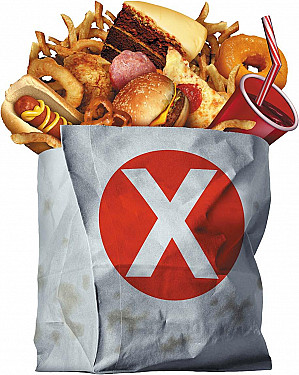Putting processed foods into perspective
Processed foods — even some that are ultra-processed — can be part of a heart-healthy diet. But check the ingredient list, and choose wisely.
- Reviewed by Christopher P. Cannon, MD, Editor in Chief, Harvard Heart Letter; Editorial Advisory Board Member, Harvard Health Publishing

Make no mistake: Eating plenty of whole or minimally processed foods is considered the best strategy for keeping your heart — and the rest of your body — in good shape. We're talking about vegetables, fruits, whole grains, legumes, and nuts. But processed foods definitely belong on your menu, too.
Anything that changes food from its natural state is considered processing. "For some foods, processing makes them safer — for example, pasteurizing raw milk," says Dr. Qi Sun, associate professor in the departments of nutrition and epidemiology at the Harvard T.H. Chan School of Public Health. This type of minimal processing doesn't substantially change the food's nutrient content. Other examples of minimal processing are chopping and freezing vegetables and fruits, and roasting chicken.
At the next level are processed foods, which have a few added ingredients. Examples of these foods are canned vegetables packed in water and salt, freshly baked bread, and peanut butter. Foods that are even more highly processed — so much that the original food often isn't recognizable — are "ultra-processed" foods (see table). They include additives such as preservatives, oil, sugar, salt, coloring, and flavoring. Examples include cheese puffs, doughnuts, breakfast cereals, frozen yogurt, packaged desserts, hot dogs, and microwavable dinners.
Calories — or something else?
The main problem with ultra-processed foods is that people simply eat far too many of them. More than half the calories in the average American's diet come from ultra-processed foods. Perhaps that's because many of them are sweet or salty carbs, like cookies and chips, that are easy to overeat. One small but carefully controlled study found that people tend to eat about 500 more calories per day when offered mainly ultra-processed foods versus mostly unprocessed foods, even when the meals contained equal amounts of major nutrients.
According to a review in the January 2024 issue of Advances in Nutrition, ultra-processed foods are linked to a higher risk of diabetes, high blood pressure, unfavorable blood lipids, and obesity. Some research hints that certain additives used in processing such as emulsifiers (which help fats and liquids blend together) play a role in raising cardiovascular risk. Another theory suggests that ultra-processed food may damage the microbiome (see "How a healthy gut helps your heart" in the November 2023 Heart Letter). But the evidence is still evolving, says Dr. Sun.
Processed foods: From minimal to ultraUnprocessed and minimally processed foods retain their healthy nutrients, in contrast to many ultra-processed foods, such as those listed below. |
|||
|
Unprocessed foods |
Minimally processed foods |
Processed foods |
Ultra-processed foods with low nutritional value |
|
Whole apple |
Prepackaged apple slices with no additives |
Unsweetened applesauce made with apples, water, and ascorbic acid to prevent browning |
Apple juice drink with high-fructose corn syrup and added coloring |
|
Whole oat groats |
Steel-cut or rolled oats |
Instant oats with added sugar |
Oatmeal cookie made mainly with white flour and sugar |
|
Dried chickpeas |
Canned chickpeas |
Store-bought hummus made with chickpeas, spices, and oil, without preservatives |
"Chickpea" chips made with mostly rice or potato flour with added salt, oil, and flavorings |
|
Source: The Nutrition Source, Harvard T.H. Chan School of Public Health. |
|||
Is processing the problem?
Instead of focusing on how little or how much a food is processed, it still makes sense to pay attention to the food's basic ingredients. "For example, some ultra-processed foods made from whole grains and dairy, including breakfast cereals and fruit-flavored, sweetened yogurt, aren't necessarily unhealthy," says Dr. Sun. Yes, less-processed alternatives — such as rolled oats and plain yogurt with fresh fruit — are healthier. But in three large observational studies done in the United States, ultra-processed whole-grain bread, breakfast cereals, and yogurt were associated with a lower risk of type 2 diabetes and cardiovascular disease.
In contrast, artificially and sugar-sweetened beverages, processed meats, and ready-to-eat dishes were linked to higher risks of those conditions, Dr. Sun says. When it comes to cutting processed food from your diet, replacing soda with water and avoiding hot dogs, salami, bologna, and cured deli meats is a good first step. And don't forget that even some minimally processed foods, such as red meat and butter, aren't good for cardiovascular health, says Dr. Sun.
Ready-to-eat dishes or microwavable frozen meals come in handy for people who don't have the time or inclination to cook from scratch, and they're often a better option than a take-out hamburger and French fries. Look for choices that include whole grains and vegetables and healthy protein sources like beans, low-fat dairy, chicken, or fish. Make sure the meal contains no more than 500 milligrams of sodium and is low in saturated fat (less than 10% of the total calories).
There's no harm in having chips or candy as an occasional splurge. Just don't let these nutrient-poor treats crowd out more healthful foods.
Image: © istetiana /Getty Images
About the Author

Julie Corliss, Executive Editor, Harvard Heart Letter
About the Reviewer

Christopher P. Cannon, MD, Editor in Chief, Harvard Heart Letter; Editorial Advisory Board Member, Harvard Health Publishing
Disclaimer:
As a service to our readers, Harvard Health Publishing provides access to our library of archived content. Please note the date of last review or update on all articles.
No content on this site, regardless of date, should ever be used as a substitute for direct medical advice from your doctor or other qualified clinician.
















